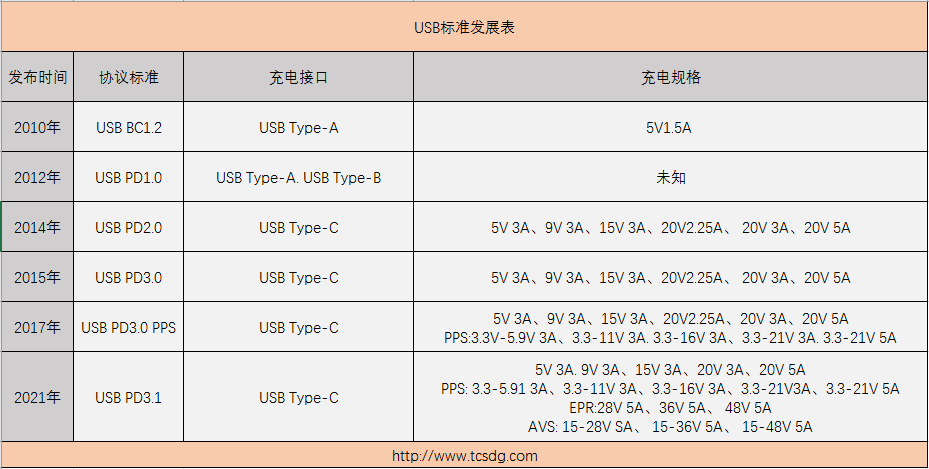
USB 3.1相较于USB 3.0有哪些升级
- 分类:技术支持
- 作者:
- 来源:
- 发布时间:2021-06-16 14:42
- 访问量:
USB 3.1相较于USB 3.0有哪些升级
- 分类:技术支持
- 作者:
- 来源:
- 发布时间:2021-06-16 14:42
- 访问量:
上个月,USB-IF协会发布了最新的USB PD3.1的快充标准,充电功率从100W提升到了240W,并且支持最大48V的电压输出(原文附于页尾)。
从字面上来看,USB PD3.1只不过是USB PD3.0上一次小更新,但从功率方面来看,这却是一次质的飞跃。这次升级到底有哪些提升呢?

关于USB PD2.0:
USB PD2.0快充标准发布于2014年8月,不仅规定了USB Type-C接口为唯一的标准接口,而且还赋予了这个接口更多的功能,比如充电、数据传输、音频传输等。在充电方面USB PD2.0定义了支持5V3A、9V3A、12V3A、15V3A、20V5A输出,最大充电功率达到100W。
不过当时还是Micro USB接口大行其道的年代,手机市场也基本已经被QC、AFC、FCP、PE等私有快充协议瓜分,USB PD快充普及难度较高。这一局面一直持续到2015年,苹果发布了业界首款搭载USB PD2.0快充标准的New MacBook,USB PD快充才正式开启了在消费类电源领域的普及之路。
关于USB PD3.0:
2015年11月,USB PD快充迎来了大版本更新,进入到了USB PD3.0快充时代。USB PD3.0相对于USB PD2.0的变化主要有三方面:增加了对设备内置电池特性更为详细的描述;增加了通过PD通信进行设备软硬件版本识别和软件更新的功能,以及增加了数字证书及数字签名功能。
简单来说,从充电参数上来看,USB PD3.0和USB PD2.0并没有变化,依然是支持5V3A、9V3A、12V3A、15V3A、20V5A输出,最大功率100W。不过这一更新也并没有让手机市场快充标准混乱的局面得到改善,快充标准依然是各自为营,互不兼容。
关于USB PD3.0 PPS:
为了改变手机市场快充协议分裂割据的局面,USB-IF协会在2017年2月发布了USB PD3.0标准的重要更新,在USB PD3.0标准的基础上增加了可编程电源PPS。
PPS属于USB PD3.0中支持的一种Power Supply类型,是一种使用USB PD协议输出的可以实现电压电流调节的电源。PPS规范整合了目前高压低电流、低压大电流两种充电模式。电压调幅降同样为20mV一档,仅为当时QC3.0标准的十分之一,调节更为精准。
并且USB-IF协会还与泰尔实验室达成了共识,旨在让PPS快充标准一统快速充电技术。 目前,PPS快充已经成为安卓手机阵营占有率非常高的快充标准,配合手机内置电荷泵,可实现高效大功率快充,小米、三星、魅族等多个品牌的机型都在用。
关于USB PD3.1:
USB PD3.1也就是USB-IF协会刚刚发布的快充标准,USB PD3.1快充标准其实是基于USB PD3.0 PPS快充的更新。
USB PD3.1快充规范将功率划分为成了标准功率范围(简称SPR)和扩展功率范围(简称EPR)两个范围。其中标准功率范围就是目前市面上主流的USB PD3.0 PPS快充标准,最大充电功率依然为100W不变;而新增的28V、36V、48V三个电压则属于拓展功率范围,三个电压对应的最大输出电流均为5A,输出功率最大可以达到240W。
除了新增三组固定电压之外,USB PD3.1标准还在拓展功率范围中增加了三组可调电压档(简称AVS),分别为15V-28V 5A、15V-36V 5A以及15V-48V 5A。AVS的最小调压步进是0.1V,并且继续沿用基于PDP的恒功率限制模式。
总结:
USB PD快充标准发展至今,已经走过了近十年的时光,期间也经历了多次标志性的迭代。其中,USB PD2.0是真正量产商用的快充标准,也为实现USB PD快充大一统奠定了基础。USB PD3.0则更多是在协议识别功能方面做了更新,充电规格并没有改变。
USB PD3.0 PPS快充标准新增了可编程电压档位,实现了对多大部分私有快充协议的兼容,成为了目前在安卓手机市场应用最广泛的一种快充充电标准。
USB PD3.1主要是扩大USB PD快充标准的适用范围,除了手机、笔电等消费类产品外,还可用于显示器、服务器、电动工具、安防POE供电的话领域,实现了“万物皆可充”的愿景。
USBIF:
DEVELOPER UPDATE CONTACTS: Brad Saunders USB Promoter Group +1 503-264-0817 brad.saunders@intel.com Joe Balich USB-IF PR +1 503-619-4113 press@usb.org USB Promoter Group Announces USB Power Delivery Specification Revision 3.1 Specification defines delivering up to 240W of power over USB Type-C® Beaverton, OR, USA – May 26, 2021 – The USB Promoter Group today announced the release of the USB Power Delivery (USB PD) Revision 3.1 specification, a major update to enable delivering up to 240W of power over the USB Type-C® cable and connector. Prior to this update, USB PD was limited to 100W via a solution based on 20V using USB Type-C cables rated at 5A. The USB Type-C specification has also been updated with Release 2.1 to define 240W cable requirements, and with the updated USB PD protocol and power supply definition, this extends the applicability of USB PD to a large number of applications where 100W wasn’t adequate. The new USB PD architecture defines a much more stringent power negotiation protocol that helps to ensure that access to and use of this higher power capability can be done safely. It should be noted that safety requirements for products that use power in the range of 100 – 240W are also more stringent than lower power products and are defined by the applicable safety specifications dictated by the regulations for each country where the products will be sold. “With the new capabilities of USB Power Delivery 3.1, we now enable higher power products such as larger notebook PCs to shift from traditional power connectors to USB Type-C,” said Brad Saunders, USB Promoter Group Chairman. “We also anticipate a wider range of product application developers outside of the traditional USB ecosystem to now consider standardizing on USB Type-C with USB PD power their power needs.” Key characteristics of the USB PD 3.1 specification include: • A choice of three new fixed voltages: 28V (above 100W), 36V (above 140W) and 48V (above 180W) joining previously defined 5V, 9V, 15V and 20V fixed voltages. • A new adjustable voltage mode enabling a range from 15V to one of three maximum voltages (28V, 36V, or 48V) depending on the available power allowing the device being powered to request specific voltages to a 100 mV resolution. USB Developer Days 2021, in the second half of this year, will include detailed technical training covering the updated USB PD and USB Type-C specifications. This update is part of the USB performance roadmap and is specifically targeted to developers at this time. Branding and marketing guidelines are being established and will include a new cable labeling solution to inform users of the power capability supported by Certified USB Type-C cables. “Always responsive to the market’s need for a higher-power, truly universal bus connector, the USB Promoter Group has again been quick to recognize and adapt its specifications for charging capability to anticipate customer requirements, potentially creating new markets for USB Power Delivery. ST, as an active member of the USB Promoter Group, with its strong company legacy of cooperation, technical expertise, and product reliability, will continue to provide high-quality, optimized semiconductor solutions,” said Matteo Lo-Presti, Executive Vice President, Analog, Sub-Group General Manager, Analog MEMS, and Sensors Group, STMicroelectronics. “The 3.1 revision to the USB Power Delivery specification, which includes the capability to provide up to 48 V and 240 W of power, will help enable additional design opportunities for current and new users of USB Type-C technology,” said Deric Waters, senior member of technical staff at Texas Instruments. About the USB Promoter Group The USB Promoter Group, comprised of Apple Inc., Hewlett-Packard Inc., Intel Corporation, Microsoft Corporation, Renesas Electronics Corporation, STMicroelectronics, and Texas Instruments, continues to develop the USB family of specifications to meet the market needs for increased functionality and performance of USB solutions. Additionally, the USB Promoter Group develops specification addendums (USB Power Delivery, USB Type-C®, and others) to extend or adapt its specifications to support more platform types or use cases where adopting USB technology will be beneficial in delivering a more ubiquitous, richer user experience. About the USB-IF The non-profit USB Implementers Forum, Inc. was formed to provide a support organization and forum for the advancement and adoption of USB technology as defined in the USB specifications. The USB-IF facilitates the development of high-quality compatible USB devices through its logo and compliance program, and promotes the benefits of USB and the quality of products that have passed compliance testing. Further information, including postings of the most recent product and technology announcements, is available by visiting the USB-IF website at www.usb.org. USB Type-C® and USB-C® are registered trademarks of USB Implementers Forum.
相关新闻
-
自动化测试系统,就找拓克硕!
2022-03-16
自动化测试系统,就找拓克硕! 东莞市拓克硕自动化有限公司是一家专业从事自动化测试及检测、控制系统仪器设备的研发、生产、销售、服务于一体的高科技企业。从事自动化测试仪器设备(ATE)、自动化控制设备(ACE)、自动化功能测试系统(ATS)、自动化控制系统(ACS)、测试系统集成(TSl)、CCD工业数字相机视觉检测系统解决方案(Machine Vision)、BGA测试解决方案等。秉承客户是上帝的理念,用心做好服务,用真诚打动客户,用爱维系客户。欢迎大家莅临本厂参观,指导!联系电话13528606106 - 钠电池产业化进度不及预期 2021-08-11
-
电动自行车锂电池市场快速发展 行业竞争加剧
2021-08-05
电动自行车锂电池市场快速发展 行业竞争加剧 -
超级硅快充充电器有哪些优势
2021-07-30
超级硅快充充电器到底有哪些优势和不足 -
Type-C和雷电接口有什么不同?
2021-07-20
雷电3接口 -
有了高增益和大带宽的电路,为什么还会发生振荡?
2021-07-05
电路发生振荡的解决方法

